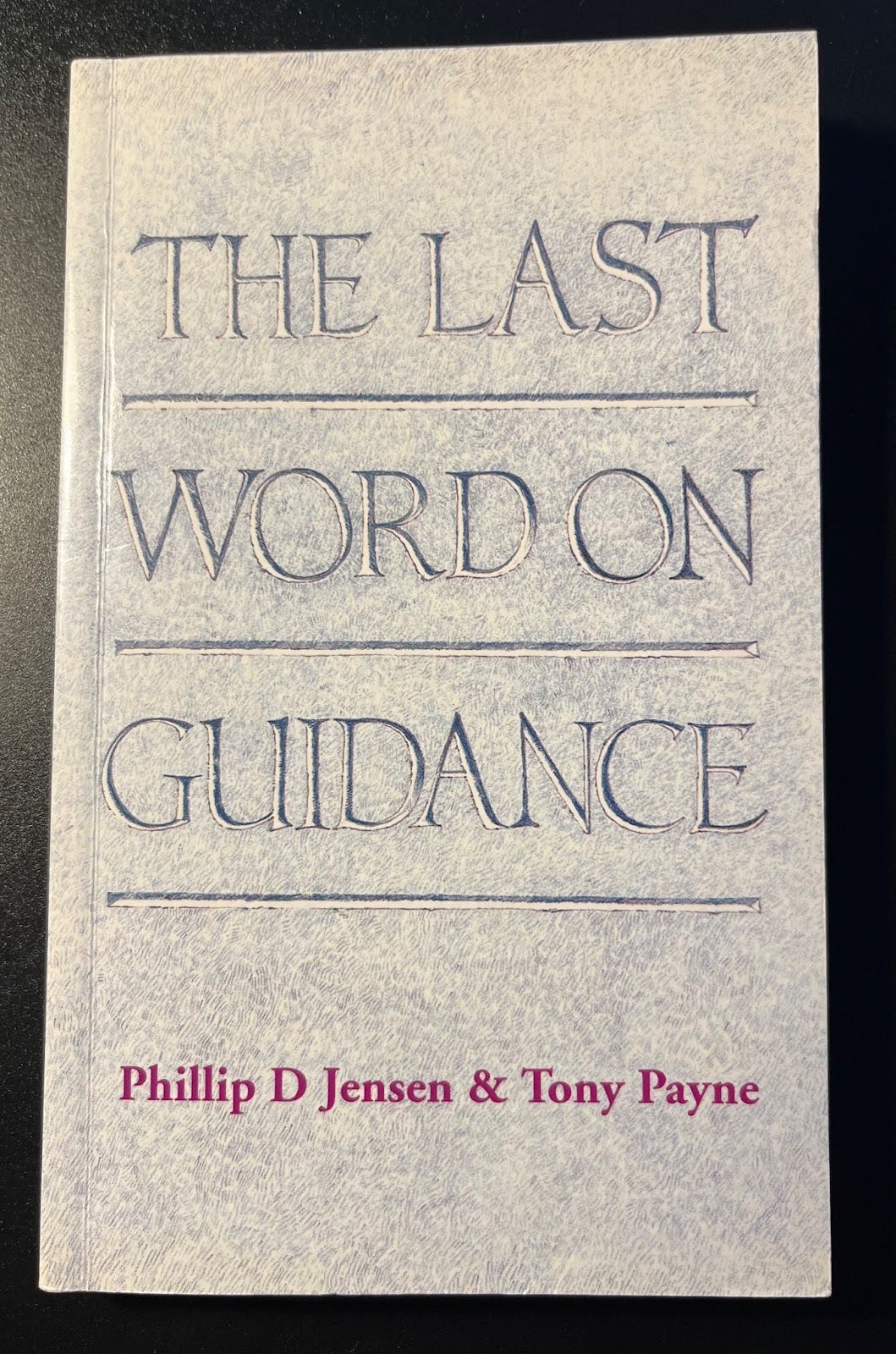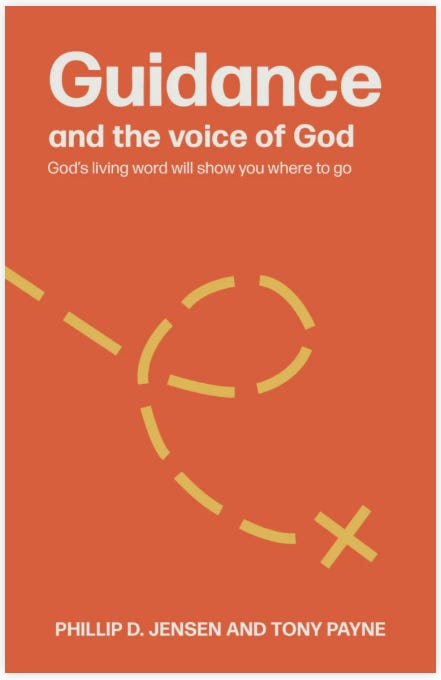Dear friends
A wide-ranging episode this week that starts with an appreciation of the gospel generosity of Tim Keller and moves from there to the blessings of positive disagreement, the problem we have in keeping personal attacks out of our debates, why Donald Robinson and John (Chappo) Chapman were so good at having productive arguments, how we should vote on the Voice referendum, and (just to cap things off) a discussion of the increasingly forgotten concept of providence and what it has to do with God’s guidance.
All in a bracing 33 minutes of conversation. Click on the player above to listen to the whole thing, or read an edited transcript below.
Your brother
Tony
The Promise of Providence
Tony Payne: A lot has happened since last we spoke together, including the death of an old friend of ours, Tim Keller. I say our ‘old friend’ because we both met him, and were blessed by him, more than 20 years ago. He was a great gospel man. Tell us about your visit with him in the 90s in New York.
Phillip Jensen: Well, I had a friend in America who said he would organize for me to meet with Tim. So I went and heard Tim preach in a Seventh Day Adventist building on one side of New York, then caught the taxi across to the other side of Central Park to a university hall, where he then spoke to another 2000-3000 people. He spoke very quietly into a microphone, as if he was having a personal conversation with these 2000-3000 people. It's an interesting style of preaching. You couldn't help but listen to him. He was a very commanding speaker.
TP: It’s interesting that he was a compelling speaker but in a very conversational, gentle style.
PJ: Yes, and this was intentional. He told me it was because so many of the young New York university graduates had grown up in the midwest of America where the preachers shout a lot. And once they went to university, they left off that kind of Christianity; they wanted something that was thoughtful. And so he purposely did not shout. He spoke to them rationally, sensibly, quietly, because he saw that as an antidote to the kind of screeching they had heard from their home churches, and which turned them off.
Afterwards, he did a Q&A for about 150 of us who stayed to listen. And it was culturally weird, if I could put it that way. The questions were not questions of content, but rather personal questions, with that American ability to talk personally about yourself in public without being embarrassed. And so it was like having a personal counseling session in front of 150 people. One man persisted with these questions about how he was being persecuted at his work. And Tim gave really clever, really well-balanced, sensitive, sensible answers. But his man kept persisting so long that I thought if I was working with him, I think I'd be on the persecutor side. He was so uninhibited and Tim was so patient and kind with him.
TP: It's the kind of man that Tim was; he was a very kind and generous man.
PJ: Yes. When I got introduced to him, he immediately organized and took me home. He had been preaching all day, but he took this foreigner in and gave me a meal. We spent hours talking before I left, and yet we knew we had much more to talk about. So he organized for me to have morning tea with him in a cafe in town the next day, where we spent a couple of more hours. And it's one of the only times I've actually sat in a cafe, pulled out a napkin and drawn out Two Ways to Live for someone. We had a very interesting conversation as two men who believed the same thing, wanted the same thing, but came from different ends of the universe, different parts of Christianity, and felt like we had much to learn from each other.
TP: I remember at St Matthias in the 90s, as we were trying to figure out how to do church planting, that you talked about Tim Keller and your conversations with him. I think we learned a lot from him about the whole process.
PJ: Yes, I came back from talking with him more determined to church plant, and seeing the tactical advantages of doing so. He showed me the evidence of how the gospel spread across the midwest through church planting—that the planting happened first, and the evangelism second, which is a different way of thinking. He showed me how closing down churches actually slows gospel spread and opening up more branches actually increases gospel spread. That was a turning point in my thinking. He was very helpful, very kind and patient. We disagreed on all kinds of things. But it was a really positive disagreement.
TP: I had quite a similar experience. In the early 2000s, Tim’s church used to run weekends where pastors could come in and see what was happening at Redeemer, learn from them, ask questions, and so on. I was in the area at the time, and went along and had a wonderful time. And likewise, Tim was very gracious in taking some time to talk with a young guy from Australia. As you say, it was a great example of going to a ministry where you immediately felt we have so much in common, we're on the same gospel cause together, and yet we approach things differently, and will disagree about some things. And in particular, it was interesting to chat with him about the whole question of recruiting for ministry. That was one of the tensions that he was feeling, because of course, his view of how you reach a city is by really encouraging people to throw themselves into their work in the city as part of their Christian life.
PJ: That was part of my discussion with him as well. He had this grand scheme of church planting, but he couldn't find church planters, because he was encouraging everybody to stay in their work and not leave it. And so while I wanted to learn from him about church planting and the whole values of it, he wanted to learn from me about how to recruit people into ministry. And it was great fun talking with each other. You know, trying to eat the same elephant from different ends, and both feeling the frustrations of working out the tactics of getting the gospel out today.
TP: It's a great example of how Christian disagreement should function. Because although Tim was a great one, a great gospel man with a great legacy of gospel work, we still disagreed about various things. Yet he was someone you could disagree with in a positive way. You could engage with him and his ideas, and he with yours, in a fruitful way—because you were trying to sharpen each other, not disagreeing with him as a Christian brother or as a gospel servant, but about this particular issue.
PJ: Yes, Christians do disagree. When Paul and Peter disagreed in Galatians, the gospel was at stake. And when Paul and Barnabas disagreed about whether to take Mark, we do not know if there might have been gospel implications, or what lay behind that disagreement. And sometimes, disagreements are necessary in order to show who is genuine and who is not (as Paul says in 1 Cor 10).
But the disagreements that we have over all kinds of other issues—over tactical issues of Christian ministry or over different aspects of theology—they're actually important and valuable. They contribute to your welfare and that of the Christian ministry. We should not avoid disagreements. But we do need to disagree properly.
Donald Robinson was fascinating in this regard. He was the Vice-Principal of Moore College when I was a student there, and he became the Archbishop of Sydney. Donald was seemingly dispassionate—you could quite strongly disagree with him on a topic, but as soon as you moved to the next topic, the last topic was closed. He never seemed to take the disagreement personally. When he was Archbishop, he and I had some very strong disagreements and difficult conversations, but when the whole discussion finished, we were personally good friends. It had nothing to do with me or him as a person, and it did not affect our friendship and love and respect for one another. He was a great model at being able to disagree.
Chappo and I also had incredible disagreements, but Chappo’s disagreement was of a different character. He disagreed to test out ideas. So when I worked with him for a couple of years, as we lived in the same part of Sydney, we would drive into work together. In the car he would start up on something he wanted to think about and provoke me into disagreeing with him, and we’d really go at it. Then on the way back, to my confusion for the first few weeks, he’d change sides and try out the other side of the argument on the way home. What he was actually doing was testing out ideas and strengthening his arguments for a particular case. If you had been in the back of the car listening, you would have thought we were the world's greatest enemies, but no two people could have been more caring and loving of each other. It was because we had a good relationship that we could really express what we thought and not worry about our relationship being damaged by it.
TP: Unfortunately so much of the disagreement we have nowadays is not positive, and some of the forums in which argue—I’m thinking about you, social media!—don’t help. It’s very common for it to become personal, rather than about the ideas or the content. It will be about my personal grievance or pain, or it will be about you and your motives and your associations. It quickly descends into ‘us and them’, into labelling and name-calling, and into accusations of bad faith.
Which kind of makes me think of the whole Voice debate we’re currently having.
PJ: Yes, you're right. And for those listeners who are overseas, later this year Australia is going to have a constitutional referendum, which will, if it passes, give a particular ‘Voice’ to Indigenous Australians. And we have a long history of our indigenous peoples being terribly marginalized and oppressed, and dreadful things have happened. And I think it's fair to say that all Australians feel and would act in any way that could improve the life of Indigenous Australians. We are all desperate to make some amends for the past, and some hope for improved life now and in the future for Indigenous Australians. Will changing the constitution help or hinder? This is a genuine question. And will this particular change in the Constitution help or hinder it? Some people say it will help, some people say it won’t, and when the referendum happens, the country will vote either yes or no. But the debate keeps on degenerating into accusations of racism.
In other words, if you're saying no, it’s because you're racist. You want to oppress the indigenous peoples even further. But if you say yes, it’s because you want to instill racism into our Constitution by having a race-based category.
TP: So it's racism either way.
PJ: Yes, and that is totally unhelpful in thinking out what would be the best way to help the indigenous communities of Australia, and for us to unify the country as much as possible. I think everyone wants the same thing. What we're dealing with is a mechanism to get there. That's not something we should be attacking each other over, because we won't be listening to the arguments and the reasons and weighing up the rights and wrongs.
TP: You also can’t help but see the political side of it. Both sides ascribe bad motives or intentions to the other side in order to seek a political advantage for themselves. And so it's hard to put those things aside, and discuss calmly and reasonably together the actual mechanism and what will be most helpful.
PJ: Yes, and I think you can vote “yes” without being a racist, and I think you can vote “no” without being a racist. But I think we've reached a stage where, in some personal conversations, people don't want to say how they would vote because of the backlash they receive for being on that side. You are either one of those ‘progressive people’ or you're one of those ‘traditionalist people’, when, in fact it may have nothing to do with being progressive or traditionalist; it may be that you think this is a good or a bad idea.
TP: I'm going to try an awkward segue here, Phillip, and say it's almost as if we need guidance, which was the topic at this year’s UNSW Mid-Year Conference (that we both attended). It’d be nice to talk about what happened there and what the message was, because in a sense, it is about the pursuit of the truth, and especially about how you sort through all the different factors that bear upon making a decision.
PJ: Thinking about God’s guidance and seeking to understand what God wants us to do in this particular circumstance is a particularly Christian way of thinking. It is caught up in that word: providence. We've been secularized in our language so that we do not talk of God's providence anymore. But it was a normal term in the 17th century, to the point that Providence is the capital city of the state of Rhode Island.
It was called Providence by the man who was the father of the state, Roger Williams. Williams was a separatist. He saw the corruption to the gospel that comes from the state Church of England, and really believed in the total separation of state and church. He was very anti-monarchy and anti-state control, and because of this the authorities in Massachusetts were seeking to put him in prison. But he narrowly escaped, marched for 50 miles in deep snow, and was rescued and looked after for several months by the Indians until winter broke. He then continued into the area of Rhode Island and found a place to set up his plantations, declaring ‘Providence’ as the name because God’s providence had provided this place for him. We wouldn't think of talking about saying “providence has provided this place for me” anymore.
TP: The word itself has almost disappeared, let alone the concept. People talk about Mother Nature these days, or they use the phrase “that's the way we're wired” as if somehow we've become “wired” to be a certain way. But we would never think of saying “that’s how God has disposed us to be wired” or “that’s how God has provided us to be framed or created”.
PJ: Yes. Sometimes you do hear people say “thank God”. That’s a little kind of hangover from the past, as if God was involved in what happened.
TP: How does providence relate to guidance, then?
PJ: Well, guidance is looking for God’s providence. But the difficulty with providence is that you don't know what God will provide, other than what he has promised to provide. Afterwards, you can look back and see his providence, but beforehand, you've got to go to where God has promised to provide something for you.
The fact that he has provided previously for somebody else is no indication that he will provide for you next time. He provided a warning for Belshazzar by writing on the wall, telling him what was going to happen. That doesn't mean that God is now going to send messages on walls and that I should read walls wherever I can, or that graffiti is God's means of communication to me. The fact that God can or has provided something doesn't mean that God will provide that for me. We should look, rather, for those areas in which God does promise to guide me. But for many people, what God has promised is not satisfactory, because he doesn't tell us whether to work for Commonwealth Bank or Westpac Bank.
TP: Or whether to vote “yes” or whether to vote “no”.
PJ: Yes. They want God to give them details on what to do, so they look for other guidance from God–a dream, or a vision perhaps. But what we're told about God is that he promises us everything that we really need to know to live a godly life in Christ Jesus (2 Peter 1:3). Can I be a Christian and work for the Commonwealth Bank of Australia? Yes. Can I be a Christian working for Westpac, or another bank? Yes. So it doesn't matter which one I work for. I should just use godly wisdom as to what would be the most helpful place for me to be working—things like how much money they pay, what are the terms and conditions, how close it is to home, all kinds of things like that. But I shouldn't be waiting for a message written on a wall to go to Commonwealth or a little voice in my head saying “go to Westpac”, or a dream of seeing someone with a logo of yet another bank on their shirt.
God promises that I will be led by the Holy Spirit to God as my Father, to Jesus as my Lord, and to put to death the bad deeds of my flesh. Those are the things that matter.
TP: So God provides very clear instruction and guidance for us to know the Lord Jesus, to live for him, to know what it means to love others, what virtues we should cultivate, what deeds we should put to death, and how we should hope for eternal life. There's lots of very clear and specific guidance about living our lives.
PJ: Yes, it's very specific. See, from the Bible, I know how to drive my car. It does not tell me how to use the clutch or the accelerator. But it does tell me about how to love my neighbour and about obeying the government. I know, therefore, that I should drive within the constraints of the governmental regulations. And I know that I should go over and above that by making sure my fellow passengers are feeling comfortable and safe when I'm driving the car.
TP: Are you saying that we should even let people in when they zoom up on the left and try to push in—that God's guidance is for us to be patient and to let the other person in, instead of tooting my horn and being rude to them?
PJ: Yes, yes, that's right. But what people really want is God's providence beforehand about guidance for the future, but you’re not given providence beforehand. It is only when looking back and seeing what God did in our lives that we can see God’s providence. And we need to look back to see it and to give thanks for it—otherwise we wind up censoring God out of existence by secularist explanations of everything. And so, let's recapture providential language, but let's recapture it in hindsight, rather than looking for guidance outside of the scriptures.
TP: That's a very good short summary you just gave, not only of last week at Mid-Year Conference, but of the little book we wrote about guidance all those years ago. You may have read it. It was originally published under the title “The Last Word on Guidance”, which I thought was perhaps the cleverest book title we've ever come up with.
PJ: Yes, and I thought of a cleverer one for the second edition, which was “The Last Word on Guidance: Revised and Updated”.
TP: The publisher wouldn’t go with that for some reason. So the second edition is called “Guidance and the Voice of God”. If you want to dig further into guidance and tease out some of the ideas we've just been discussing, grab hold of that book.
PS
Here’s a photo of the original edition of our book on guidance, published way back in 1991:
And here’s what the new edition from Matthias Media looks like these days:
If you haven’t ever read it, it’s worth a look. Even better, grab a few copies and read it with friends. You can find it here.
As always, it’s free to receive episodes each week. But if you’ve been finding Two Ways News encouraging and useful, we’d also like you to consider joining our Supporters Club—the people who make it possible for us to keep producing this newsletter/podcast.
When you follow the link below to the ‘subscribe’ page, you’ll see that there’s:
the free option (on the far right hand side)
but also a number ‘paid options’. To join the Supporters Club you take out one of the paid ‘subscription plans’, and as a thank you, we send out bonus episodes and other material to Supporters Club members from time to time.
Sign up for free or join the Supporters Club.














